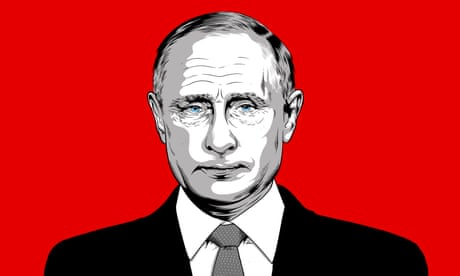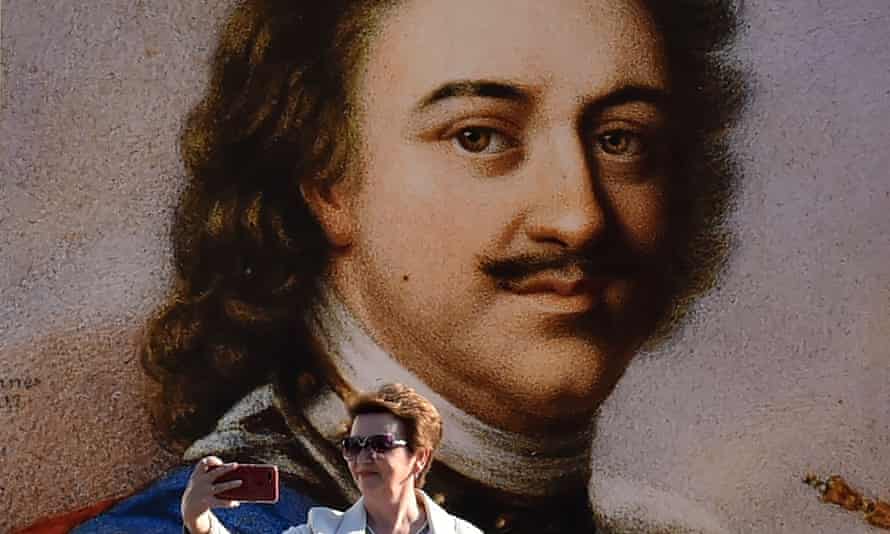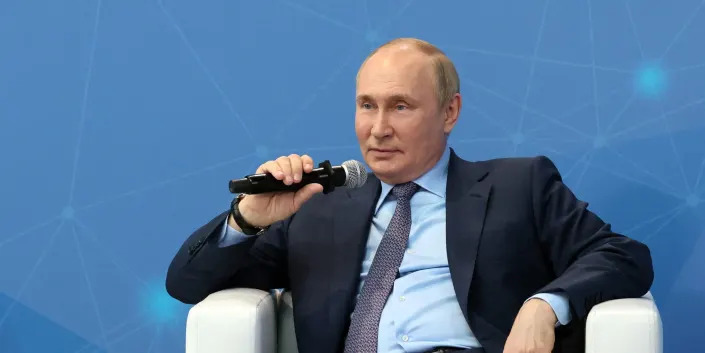
President draws parallel with tsar who waged war on Sweden and says campaign in Ukraine stems from ‘basic values’
01:10 Putin compares himself to Peter the Great in Russian territorial push
Andrew Roth and agencies
Vladimir Putin has compared himself to the 18th-century Russian tsar Peter the Great, drawing a parallel between what he portrayed as their twin historic quests to win back Russian lands.
“Peter the Great waged the great northern war for 21 years. It would seem that he was at war with Sweden, he took something from them. He did not take anything from them, he returned [what was Russia’s],” the Russian president said on Thursday after a visiting an exhibition dedicated to the tsar.
After months of denials that Russia is driven by imperial ambitions in Ukraine, Putin appeared to embrace that mission, comparing Peter’s campaign with Russia’s current military actions.

Understanding Vladimir Putin, the man who fooled the world
“Apparently, it is also our lot to return [what is Russia’s] and strengthen [the country]. And if we proceed from the fact that these basic values form the basis of our existence, we will certainly succeed in solving the tasks that we face.”
Putin, now in his 23rd year in power, has repeatedly sought to justify Russia’s actions in Ukraine, where his forces have devastated cities, killed thousands and forced millions of people to flee, by propounding a view of history that asserts Ukraine has no real national identity or tradition of statehood.

Critics said Putin’s remarks proved that his complaints about historical injustice, eastward Nato expansion, and other grievances with the west were all a facade for a traditional war of conquest.
An adviser to the Ukrainian government said the comments showed that attempts to negotiate with Putin or find an “off-ramp” from the conflict for Putin, as the French president, Emmanuel Macron, has sought to do, were misguided.
“Putin’s confession of land seizures and comparing himself with Peter the Great prove: there was no ‘conflict’, only the country’s bloody seizure under contrived pretexts of people’s genocide,” said Mykhailo Podolyak. “We should not talk about [Russia] ‘saving face’, but about its immediate de-imperialisation.”
Carl Bildt, a former prime minister of Sweden, called Putin’s desire to take back lands claimed by Russia a “recipe for years of wars”.
Peter the Great, an autocratic moderniser admired by liberal and conservative Russians alike, ruled for 43 years and gave his name to a new capital, St Petersburg – Putin’s home town – that he ordered built on land he conquered from Sweden.
It was a project that cost the lives of tens of thousands of serfs, conscripted as forced labourers to build Peter’s “window to Europe” in the swamps of the Baltic Sea coast.
Before Putin’s visit to the exhibition, state television aired a documentary praising Peter the Great as a tough military leader, greatly expanding Russian territory at the expense of Sweden and the Ottoman empire with the modernised army and navy he built.
Putin denied that Russia was seeking to occupy new land in its Ukraine invasion, but the Kremlin’s actions show that is not true. Russia has steadily sought to integrate newly captured land in Donetsk and Luhansk, as well as the Kherson and Zaporizhzhia regions in southern Ukraine.
Meduza, a Russian-language outlet, reported this week that the Kremlin was planning to combine all the lands into a new federal district that could be annexed by Russia as soon as this autumn. Amid rumours that new “referendums” could be held to rubber-stamp an annexation, the Kremlin has only said that it is up to those regions that are under military occupation to decide their future.

In recent years, Putin’s interest in Russian history has loomed ever larger in his public appearances.
In April 2020, as Russia entered its first coronavirus lockdown, he drew bemusement in some quarters when, during a televised address to the nation, he compared the pandemic to ninth-century Turkic nomadic invasions of medieval Russia.
In July 2021, the Kremlin published an almost 7,000-word essay by Putin, entitled “On the historical unity of Russians and Ukrainians”, in which he argued that Russia and Ukraine were one nation, artificially divided. It laid the groundwork for his deployment of troops to Ukraine in February.
Moscow attempted to justify its war in Ukraine by saying it was sending troops over the border to disarm and “denazify” its neighbour, an unfounded claim.
By contrast, the Russian leader offered cautious praise for Joseph Stalin for creating “a tightly centralised and absolutely unitary state”, even as he acknowledged the Soviet dictator’s record of “totalitarian” repression.
Putin has a history of praising leaders sharing his own conservative views, including tsar Alexander III and pre-revolutionary prime minister Pyotr Stolypin, both of whom have had monuments in their honour erected across the country.
Meanwhile, leaders seen as antithetical to a strong, unitary Russian state – including Lenin and Nikita Khrushchev – have seen their contributions played down.
“Putin, celebrating the 350th anniversary of Peter the Great’s birth, is confused about history again,” wrote Andrei Kolesnikov, a Russian political analyst. “Peter the Great has opened a window to Europe, Putin is hammering it up with rotten planks from the time of Ivan the Terrible.”
Reuters contributed to this report
Putin undermined his own rationale for invading Ukraine, admitting that the war is to expand Russian territory
Putin said on Thursday that the Ukraine invasion is about expanding Russian territory.
Until now Putin had insisted that Russia was freeing Ukraine from so-called Nazis and preventing genocide.
Putin said it was his destiny to "return and reinforce" Russia as the 17th-century ruler Peter the Great did.
Russian President Vladimir Putin said publicly for the first time Thursday that his invasion of Ukraine is about expanding Russian territory, as Western leaders have long maintained.
To date, Putin has justified the invasion by saying, baselessly, that he is preventing Ukraine and what he described as a neo-Nazi government from committing genocide against ethnic Russians. He has also said that NATO's eastward expansion threatens Russia's national security.
Speaking to students Thursday after visiting an exhibition about Peter the Great, Russia's first emperor credited with making the country a major power in the early 18th century, Putin compared himself to the ruler and said they were both destined to expand Russia.
"Clearly, it fell to our lot to return and reinforce [Russia] as well. And if we operate on the premise that these basic values constitute the basis of our existence, we will certainly succeed in achieving our goals," he said.
As well as seizing territory in a 21-year war with Sweden in the late 17th century, Peter also captured the territory of Azov from Crimean Tatars, who were aligned with Turkey, in 1696, and seized territory on the Caspian Sea from Persia in 1723.
"On the face of it, he was at war with Sweden taking something away from it," Putin said of Peter. "He was returning and reinforcing, that is what he was doing."
In a tweet Friday, Mykhailo Podolyak, an advisor to Ukrainian President Volodymyr Zelenskyy, said Putin's comments prove his "contrived pretexts of people's genocide" in Ukraine were false and demanded "immediate de-imperialization" of Russia.
Putin's attempts to expand Russian territory started long before his invasion of Ukraine on February 24.
Putin invaded Georgia in 2008 and is currently backing pro-Kremlin factions there. In 2014, it annexed the Crimean Peninsula from Ukraine and invaded the Donbas region of eastern Ukraine via proxies that same year.
Just two days before invading Ukraine, Putin said claims he wanted to restore the Russian empire were false.
However, Western leaders have long maintained that this was not the case.
"He has much larger ambitions than Ukraine. He wants to, in fact, reestablish the former Soviet Union. That's what this is about," President Joe Biden said on February 24, the first day of the invasion.


No comments:
Post a Comment